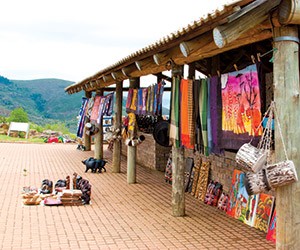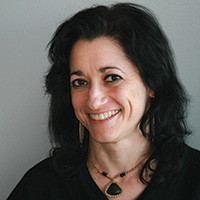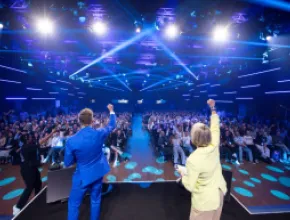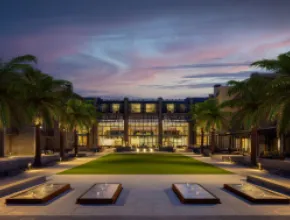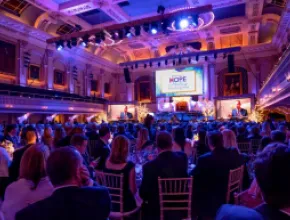South Africa’s vast cultural landscape encompasses various musical and artistic styles, as well as a history that spans everything from the origins of mankind to ancient African civilizations, from the freedom struggle and apartheid era to icons such as Nelson Mandela.
Groups can delve into the country’s rich heritage with a wealth of museums, historic homes, walking tours and local encounters, whether it’s Zulu dancing at a cultural village or following the footsteps of Mandela’s life.
“Our market insights tell us that people do not come to South Africa to experience a version of America or Europe,” says Amanda Kotze-Nhlapo, executive manager of the South African National Convention Bureau (SANCB). “Our unique culture and service ethic attract business to our shores as much as our capability, track record and infrastructure do.”
The SANCB and local tourism offices work together to entice groups with myriad programs during conventions as well as for pre and post tours.
“We do make every effort to ensure that our visitor experiences are genuine and true to South Africa,” Kotze-Nhlapo says. “One way we do this is to work closely with the product team to ensure itineraries are authentic and give true South African experiences. We also like to make sure that we incorporate local culture and heritage into our business events programs.”
Johannesburg/Gauteng
The Gauteng region is home to Johannesburg, Pretoria—the administrative capital of the country—and the township of Soweto, where the anti-apartheid 1976 Soweto uprisings took place. Gauteng offers groups myriad attractions and experiences.
For insight into the struggle against apartheid, the 128-acre Freedom Park near Pretoria commemorates those who fought for freedom, including an eternal flame and memorial on the crest of Salvokop hill.
Groups can use the outdoor amphitheater or the indoor Gallery of Leaders for smaller events, as well as the intimate Moshate hospitality suite. The Sanctuary can also host groups for award ceremonies and other events.
Liliesleaf farm is also a popular spot for groups, according to Nonnie Kubeka, executive manager of Gauteng Convention and Events Bureau. Once the headquarters of Umkhonto we Sizwe, the military wing of the African National Congress and the Congress Alliance, Liliesleaf was also the location where the high command met to plan the overthrow of the apartheid regime.
Conference facilities are available to groups, as well as options to arrange dinners and receptions. PageBreak
Overlooking Johannesburg and the surrounding area, Constitution Hill is the site of Johannesburg’s notorious Old Fort Prison Complex, where many of South Africa’s political activists, including Mahatma Gandhi and Nelson Mandela, were detained.
Groups can use the Old Fort Atrium, which connects two old prison wings, for receptions, as well as the outdoor Constitutional Square, among other venues.
The sprawling Cradle of Mankind World Heritage Site contains 200 unexplored caves and has 14 excavated fossil sites, including Sterkfontein. The Sterkfontein Caves are where the skull of “Mrs. Ples,” a 2.3 million-year-old find that pointed to human origins as having emerged from Africa, was discovered.
On-site, the Maropeng Visitor Centre features an interactive display, which interprets human origins, and is also home to a craft market, amphitheater, boutique hotel and conference facilities for more than 500.
Tours of the Soweto township can be arranged by DMCs and tour companies, including stops at the Hector Pieterson Museum, which commemorates the role of the country’s students in the struggle against apartheid.
Cape Town/Western Cape
The Western Cape, home to Cape Town, offers a wealth of opportunities for history and culture lovers.
“Cape Town forms a great base for the DMC side of the business, as this is where most of our incentive groups run,” says Neulah Mallinson, director for Ovation South Africa, a DMC with offices in Johannesburg and Cape Town.
Visits to outlying townships are also popular with groups.PageBreak
“Each and every tour into the township is custom created to meet the needs of each client,” Mallinson says. “For example, a group of doctors may view a local clinic where a group of school principals would rather see a school. We usually incorporate the history of the area on the tour, visiting the oldest township, Langa, as a starting point.”
Guests have the opportunity to try local cuisine, such as roosterkoek (breads baked over a fire), “walkie talkies” (chicken heads and feet) or “smileys” (sheeps head).
Ovation also arranges CSR activities in townships, such as painting a school or planting a kitchen garden. Drumming sessions can be organized for dinners, team building or as part of a township experience.
“We have also created programs teaching local skills, such as beading, African Diski dancing and cooking,” Mallinson says.
The Diski dance is composed of a series of soccer moves and was created for the 2010 FIFA World Cup.
Robben Island, where Nelson Mandela was imprisoned for 18 of his 27 years of incarceration, caters to groups with a range of venues. Facilities include a boardroom, conference space and a guesthouse, as well as an enclosed observation deck for functions.
Footsteps to Freedom offers Mandela-focused city walking tours, in addition to Cape Town tours that follow the journey of slavery in the Cape leading up to apartheid, as well as the chronology of Mandela’s life. The tours visit sites such as the Slave Precinct, Robben Island, City Hall and the Grand Parade.
Madiba Tours also offers Mandela-themed tours.
“Madiba Tours are one of the best ways to gain insight into South African culture and the country’s history, as these tours follow the footsteps of Nelson Mandela in Cape Town—South Africa’s most loved symbol of peace and unity,” says Enver Duminy, CEO of Cape Town Tourism.
Durban/KwaZulu-Natal
KwaZulu-Natal province also has a deep and varied cultural heritage, including one of the largest Indian communities outside India, as evidenced on the streets of Durban. The coastal city is also home to an array of art galleries, theaters and museums.
The province is the heart of the Zulu Kingdom. Groups are welcome at Shakaland Zulu cultural village, originally built as the set of the movie Shaka Zulu, which documented the life of the most influential leader of the Zulu empire. Groups can learn Zulu traditions and craftsmanship, including pottery making, beadwork and tribal dancing.
North West Province
Near the Sun City Resort Complex, groups can arrange visits of several cultural villages, including the Lesedi Cultural Village, with its five replica traditional homesteads. In the evening, guests are escorted to a boma (outdoor dining area) for singing and dancing.
The Mphebatho Museum in Soulspoort preserves the culture and traditions of the Bakgatla-Ba-Kgafela, a Tswana community. The museum is located in Moruleng village near Sun City, and can arrange traditional dancing, cultural activities and a boma for storytelling.
Marlene Goldman is a frequent contributor to Meetings Focus.



